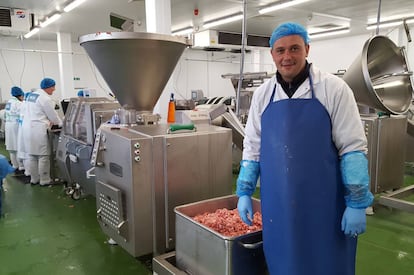Could Brexit bring about the end of the English sausage?
A third of workers in the British food industry are foreign, mostly from the European Union


Without Vladim, Iclodean, Ludmila, Georgeta and Saulius, the products made by Heck Sausages would never reach the British dinner table. According to the owner of this growing family business, Debbie Keeble, the company’s survival depends on the foreigners who make up the bulk of its workforce.
On the factory floor, Vladim Protasovs looks over an enormous tray of mince before stopping the machine that will pump it into sausage skins. Dressed in white trousers and blue apron, gloves and cap, this 35-year-old Lithuanian is in charge of the production line. He is one of a staff of 70 at the small company in North Yorkshire. A total of 60 of them come from Eastern Europe.
Some are wondering what the British will eat if Brexit negotiations cause this source of labor to dry up
Of course, it’s not just Heck Sausages that depends on labor from the EU. Foreign employees account for 30% of berry pickers and almost 90% of seasonal workers in the horticultural sector, which has a turnover of €3.4 billion a year. Now some are wondering what the British will eat if Brexit negotiations cause this source of labor to dry up.
Just a month after British Prime Minister Theresa May ordered the triggering of Article 50, signaling Britain’s intention to exit Europe, a parliamentary report drew attention to the fact that 30% of workers in the British food industry were foreign. It also indicated that without free movement of labor, the sector would run into trouble. Entitled: “Feeding a Nation, Labor Restrictions,” the report warned that some areas within the industry could descend into crisis, sending food prices skyrocketing.

At Heck Sausages, Debbie Keeble says that they are already feeling the effects of Brexit, despite the fact that negotiations have not yet begun. “We are currently facing an enormous challenge to keep the company afloat and keep it growing,” she explains.
Heck’s sausages are selling well and the company needs more staff. This is more pressing because, after their success with gluten-free sausages, they have branched out into vegan fare. But Keeble says they’re having difficulty filling job vacancies. “People are scared to come to Britain now because they don’t know what is going to happen with Brexit. If they can, they go elsewhere,” she explains.
Vladim Protasovs came to Heck Sausages four years ago with his wife, Ludmila. They have settled in the nearby market town of Bedale, where their two children go to school. The couple believe that returning to Lithuania would not be a good move, particularly for their kids. But they are scared that things in Britain are about to change. Like most of the workers at the sausage factory, they found out about Heck through word-of-mouth and have recommended it to acquaintances themselves. “Hardly any of our friends are prepared to come anymore,” says Vladim.

It’s not just the instability and uncertainty generated by an agreement yet to be negotiated that is putting off potential workers from coming. There is also the fact that the pound has devalued by 20%, which means that earnings are worth much less back home. Companies dealing in temporary employment, such as the Romanian outfit Esr-Vest, say that it is now much harder to fill vacancies.
People are scared to come to Britain now because they don’t know what is going to happen with Brexit Heck Sausages co-owner Debbie Keeble
These are jobs, Keeble explains, that the British don’t want. This is not only the case in the meat sector, which has a 63% foreign workforce, but applies to almost all areas of the food industry. A life-long Conservative, Keeble, 52, feels indignant that immigration became the main thrust of the Brexit campaign. “It was all about people from other countries coming to take British jobs when that’s not true. Nobody applies for these jobs,” she says.
Keeble voted to remain, so she got an unpleasant surprise on June 23 when she awoke to the news that the United Kingdom had voted to leave, particularly in North Yorkshire, where 59% were in favor of coming out of the EU compared to the national average of 52%.
Yet Yorkshire companies are set to be hit hard by Brexit. Guy Poskitt, Director of the Yorkshire company Poskitt’s Carrots, says that Brexit will mean a major upheaval for the sector.
These are jobs, Keeble explains, that the British don’t want
At Heck, another Lithuanian Saelius Serelis, 51, expresses disappointment with the results of the referendum. For him it’s not about whether foreigners will be able to access jobs in the same way. He believes that agreements will be reached to maintain freedom of movement within the EU. Rather he feels somewhat hurt that his neighbors for the past 14 years would vote for Brexit so that people like him would not be able to settle in the UK.
English version by Heather Galloway.
Pricier eating habits
During the Brexit campaign, there was a lot of talk about the price of ice creams going up if Britain left the EU. This might seem trivial, but the fact is if it costs more to import milk, these and other milk-based products will rise in price. In fact, if no free trade agreement is reached, then ice cream, along with wine, fruit and other food imported from Europe, will cost more. Meanwhile, the House of Lords pointed out last month that leaving the EU without a free-trade agreement would put 97% of British food and drink exports at risk.
In the last 20 years, the British have changed their eating habits. Today 20% of the food consumed in the UK comes from Europe as Tim Lang, lecturer at London City University and Victoria Schoen, an agricultural economist, pointed out in a report warning that price spikes will force the British to abandon their increasingly healthy fresh fruit and vegetable diet, which in turn will lead to a decline in well-being.
Tu suscripción se está usando en otro dispositivo
¿Quieres añadir otro usuario a tu suscripción?
Si continúas leyendo en este dispositivo, no se podrá leer en el otro.
FlechaTu suscripción se está usando en otro dispositivo y solo puedes acceder a EL PAÍS desde un dispositivo a la vez.
Si quieres compartir tu cuenta, cambia tu suscripción a la modalidad Premium, así podrás añadir otro usuario. Cada uno accederá con su propia cuenta de email, lo que os permitirá personalizar vuestra experiencia en EL PAÍS.
¿Tienes una suscripción de empresa? Accede aquí para contratar más cuentas.
En el caso de no saber quién está usando tu cuenta, te recomendamos cambiar tu contraseña aquí.
Si decides continuar compartiendo tu cuenta, este mensaje se mostrará en tu dispositivo y en el de la otra persona que está usando tu cuenta de forma indefinida, afectando a tu experiencia de lectura. Puedes consultar aquí los términos y condiciones de la suscripción digital.








































